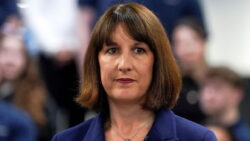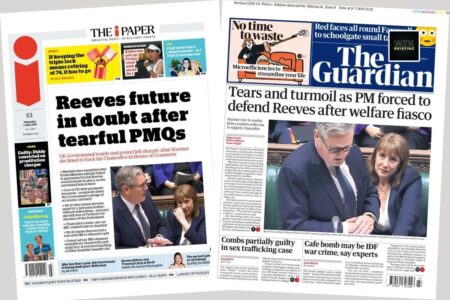The UK Chancellor Rachel Reeves appeared at the Labour Party conference earlier in the week in and gave a speech arguably more important than that of the prime ministers.
Headline-worthy comments such as no return to austerity – a word now closely linked with the 14-year Conservative rule, made a splash … but what was really uncovered in the chancellor’s speech?
Below we have three centre-left business newspapers that offer up their assessment of the chancellor’s upcoming Budget.
Below that – you can compare the left and right-wing newspaper headlines in their coverage of the upcoming Labour Budget.
What is the Budget?
Each year, the chancellor of the exchequer – who is in charge of the government’s finances – makes a Budget statement to MPs in the House of Commons, external.
The speech outlines the government’s plans for raising or lowering taxes.
It also includes big decisions about spending on health, schools, police and other public services.
The previous Conservative Chancellor, Jeremy Hunt, delivered the last Budget on March 2024, before the general election.
But after a change of government, the new chancellor holds another Budget, in autumn, to set out their financial priorities.
Source: BBC News
When is the autumn Budget and what time is the speech?
The 2024 autumn Budget is on Wednesday 30 October.
The Budget speech usually starts at about 12:30 UK time and lasts about an hour. It will be broadcast live on the BBC iPlayer and on the BBC News website.
The current leader of the opposition, Conservative Party leader Rishi Sunak, will give a speech responding to the Budget as soon as Reeves sits down.
Source: BBC News
What happens after the Budget speech?
The Treasury, the government department in charge of the economy and public spending, publishes a report alongside the Budget speech. It gives more details about the measures announced and what they will cost.
The independent Office for Budget Responsibility (OBR), which monitors government spending, also produces an independent assessment of the health of the UK economy.
After the statement, MPs spend several days debating the plans. They are then asked to approve the proposals and the government introduces a Finance Bill to turn the Budget announcements into law.
Source: BBC News
How is the UK economy doing?
The chancellor’s speech at the Labour Party conference confirmed that boosting the economy is one of the government’s key priorities.
Reeves talked about the “long-term prize” that would follow if Labour can restore stability.
A growing economy usually means people spend more, extra jobs are created, more tax is paid and workers get better pay rises.
Following a brief recession at the end of 2023, the UK grew solidly during the first six months of 2024, and recorded the fastest growth of all the G7 countries.
However, the UK economy stalled in June and July.
When Labour took power, Reeves said it had “inherited the worst set of circumstances since the Second World War” regarding government finances – something the Conservatives deny.
She said she was facing a £22bn “black hole”, and warned that the government would have to raise some taxes as a result.
This gap is due to rules the government has chosen to follow over how much money it can borrow over the next five years.
Source: BBC News
What might be in the Budget?
The government has already ruled out raising VAT (value added tax), income tax and National Insurance.
But after the warning about “difficult decisions”, there has been a lot of speculation about other possible tax rises which could be announced:
Capital gains tax (CGT)
CGT, external is charged on the profit made from the sale of assets that have increased in value, such as second homes or investments.
It is paid by individuals and some business owners, and the rates vary depending on how much income tax you pay.
Inheritance tax (IHT)
IHT, external, which is currently 40%, is usually paid on the value of a deceased person’s assets above a threshold of £325,000.
Fuel duty
Fuel duty has not risen in more than a decade, external. It was frozen between 2012 and 2022, and cut by 5p in March 2022 when pump prices surged following Russia’s invasion of Ukraine.
However, some motoring groups argue the cut was never passed on to motorists and the RAC says it could be reversed.
Pension tax relief
People who pay into private pension pots get tax relief on their contributions, external, up to a certain amount. This boosts the amount saved.
At the moment, savers receive tax relief at the same rate as their income tax – so basic rate taxpayers get tax relief at 20% and higher rate taxpayers at 40% or 45%.
The government could introduce a single flat rate of relief which would make the system less generous for higher earners.
Non-dom tax status
The term “non-dom” describes a UK resident whose permanent home – or domicile – for tax purposes is outside the UK. As a result, they do not pay UK tax on money they make elsewhere.
In the March Budget, the then-Chancellor Jeremy Hunt said non-dom tax status would be abolished, although there were some concessions.
Labour has said it wants to toughen the existing plans, although these plans might be reconsidered amid worries they will bring in less money than expected.
Source: BBC News
What has already been announced?
Winter fuel payments
The government has said future payments will only be made to those getting pension credit or other means-tested help.
The plans have been criticised by some MPs, unions and charities.
State pension
The state pension is set to rise by 4% in April 2025.
The increase will be confirmed by Work and Pensions Secretary Liz Kendall around the time of the Budget.
VAT on private schools
The government has said VAT will be added to private school fees from 1 January
Some private schools will lose business rates relief.
Energy windfall tax
The government is increasing the windfall tax on the profits oil and gas firms make in the UK. The energy profits levy is due to rise to 38% from 35% on 1 November, external, and will remain in place until 31 March 2030.

- Sources below are British and their opinions lean closer to the left
- Centrist, liberal, neo-liberal, and conservative-liberal, progressive
Unlocking Labour’s investment dilemma
“In the standard textbook model that Reeves would have learned at Oxford and the London School of Economics in the late 1990s, business investment is a reward for governments that behave nicely. Investors want low tax rates, flexible markets and, above all, stability. Any hint of an increase in borrowing and they will spook, worrying that government debt will spiral out of control. In this kind of model, even austerity can be expansionary, as it demonstrates to the business community that the fiscal authorities are really committed, even at the expense of electoral pain.”
Labour warming up for tax rises
“Labour will never have a better chance to make big, ambitious changes. Rather than playing up the gloom, the government could be telling a positive story about the benefits a pro-growth agenda will bring – as they have with planning reforms. Just as building more houses spreads ownership, jobs and opportunities, boosting public sector productivity would result in a leaner, more effective state that better serves British interests. Instead, we are getting a warm-up for a much more predictable second act: Tax rises are coming, look behind you!”
Political strategy to temper public expectations
“While Reeves may have been shocked by the detail of the public finances, and her outrage at Tory mismanagement wholly justified, her performance was largely planned in advance. The broad fiscal picture was known before the election. This was all part of a political strategy to temper public expectations, affix blame to the Conservatives and instil patience in her own MPs. It is also likely that the tax rises she implied were unnecessary during the election, but will announce in October, have long been known to her.”
How has the media covered the chancellor's plans?
Left wing media sources
- How Rachel Reeves could release billions more for investment in the budget
- Britain’s budget choices are not as bad as the government says
- Budget uncertainty is weighing on UK economy, say businesses
- How Labour could raise taxes as Starmer admits budget will be ‘painful’
- Labour should ditch doom and gloom message for one of economic renewal
Right wing media sources
- Rachel Reeves isn’t just ignorant. Her plans are a danger to Britain
- Yes the economy needs fixing Rachel Reeves – but don’t squeeze businesses like a lemon with eye-popping tax rises
- We’ll all foot the bill for Rachel Reeves’ latest monumental Budget tax raid error
- Starmer and Reeves are about to learn a hard lesson in simple economics
- The Times view on Labour’s non-dom tax crackdown: False Economy





